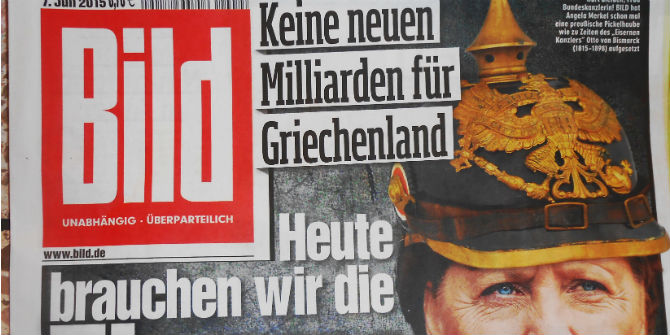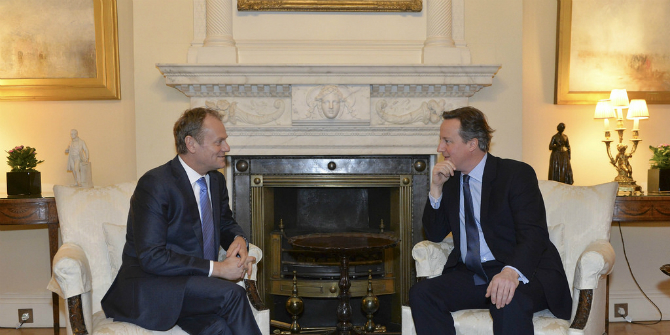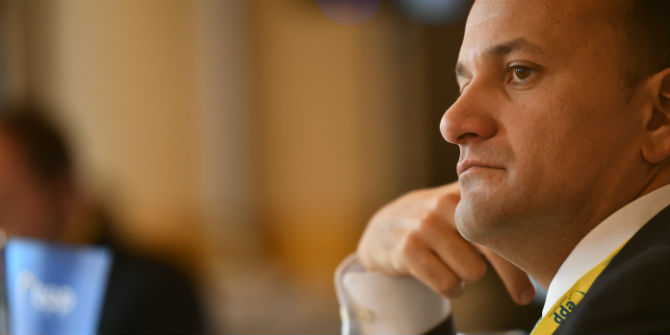 The EU’s drive for social, political and economic unity threatens Europe’s historical traditions of diversity, writes Martyn Rady. He argues that whilst Europe shares much in terms of common history and culture, this is not in itself sufficient to underpin political union across the continent – or indeed to foster a shared European identity.
The EU’s drive for social, political and economic unity threatens Europe’s historical traditions of diversity, writes Martyn Rady. He argues that whilst Europe shares much in terms of common history and culture, this is not in itself sufficient to underpin political union across the continent – or indeed to foster a shared European identity.
Europe is not the same as the European Union. The European Union is only an episode in Europe’s history. The two, nevertheless, are frequently treated as if they were identical. It is, however, entirely possible to be a Europhile, in the sense of valuing and engaging with Europe’s cultures, peoples and history, and to be opposed to the European Union and thus to Britain’s continued membership of it.
Britain and continental Europe share much. Cultural, religious, philosophical and political movements and ideas have spilled across from one to the other. It would be strange if they had not, given their proximity. Nevertheless, exchanges of this kind are hardly sufficient to justify political union. The histories of Poland and Russia are similarly entangled, but no one would now suggest that they should join together.
The way that ideas have spread in Europe is important. One of the strengths of Europe has been its diversity. The separate experiences of Europe’s countries have acted as inspirations and warnings to others. The example of British manufacturing in the eighteenth and nineteenth centuries, underpinned by the free-trade philosophy of Smith and Ricardo, overturned the regulatory and protectionist regime that prevailed across much of Central Europe. Bismarck’s early welfare state and Swiss federalism had their own emulators. Across large parts of Europe, the lesson of the French Revolution stimulated the politics of conservatism and of gradual change, and so on.
The high modernist ideology that underpins the EU is predicated on the erosion of differences between countries. It would seek to impose single solutions that are blind to complexity and inimical to the sort of local experimentation that has been one of the driving forces in European history. Not only therefore are the EU and Europe different things. By putting its stress on political, economic and social convergence, the EU may also be antithetical to Europe’s historical dynamic.

The history of multinational ventures in Europe is not a good one. Over four hundred years, the Habsburg Empire was unable to cement a workable enterprise. It only held together in the nineteenth century by striking bargains between the various national groups and by keeping them all, in the words of one Austrian prime minister, ‘in a condition of even and well-modulated discontent’. It is the same in the European Union today. The European Council brokers between national governments. ‘European policy’ is not European at all, but an amalgam and compromise between contending national policies.
The Habsburg Empire was not alone in being divided by local identities. Before Bismarck, the German lands were split between states with their own different political complexions, religious affiliations and regional allegiances. They were successfully brought together after 1870 because a larger pan-German sense of belonging had taken root, having been actively promoted in literature, folklore collections, and high scholarship. In the German lands, poets, historians and lexicographers made political union possible.
France went down a different route in the nineteenth century. At its start, less than a half of France’s population spoke the French language. The Marseillaise, sung in 1792 by volunteers from the Provençal south, was incomprehensible to most Parisians. Over the course of the century, the French state made a nation of Frenchmen—coercing a sense of national belonging and a single language through the schoolroom, bureaucracy and army. A similar pattern of cultural impressment took place in nineteenth-century Bohemia. Peasants from Moravia and Austrian Silesia were made into Czechs.
A political union will only prosper if its peoples feel some sense of common belonging that makes them willing to make sacrifices for one another. This is lacking in the European Union – Germans will not make financial sacrifices for the Mediterranean countries, while other states put up barriers to keep migrants on their neighbours’ soil. Without the ambitious cultural project on which German unity was built or the drive towards cultural homogenisation undertaken in France, the European Union will remain a discordant assemblage of competing national voices, unwilling to share burdens.
So the European Union offers the worst of both worlds. Its regulatory regime and policies of convergence threaten Europe’s historical experience of learning through diversity. Yet the European Union lacks the cultural underpinnings to construct an enduring political union, based on a sense of common identity. To adapt the satirist Karl Kraus’s verdict on the Habsburg Empire, it has already become a grand experiment in failure.
This post represents the views of the author and not those of the BrexitVote blog, nor the LSE. It first appeared in History Today and at UCL’s European Institute blog.
Martyn Rady is Masaryk Professor of Central European History at the UCL School of Slavonic and East European Studies.







Spot on. The EU adds Mass, but reduces Velocity – exactly what we don’t want in the modern world
http://www.diplomatmagazine.com/issues/2015/may-june/961-the-physics-of-diplomacy.html
This is why they are trying to destroy national identity with immigration from refugees outside the EU and migration from within the EU. Without destroying the cultures and identities of individual nations a superstate is impossible. Of course this is an extremely dangerous experiment.
The debate on the viability or otherwise of the EU has all along been a lop-sided affair.The sceptics and critics have diverse arguments against crucial aspects ot its running or, increasingly, have decided it is beyond repair.
The growing antagonism is due to a certain intransigence on the part of the EU executive and its leading spokespersons.On the other side we have the pro-EU diehards who favour the EU right or wrong, also EU philliacs who are great believers in pan-European cooperation and think the EU is the only vehicle to be able to deliver, then the committed federalists who forge ahead come what may and who are virtually indistinguishable from the neo-feudal globalists in the pay of …whoever, and not least those who believe, rightly or wrongly, that their economic security depends on the EU gravy train.
It is a fact that they who are defending what they see as their life’s work and or who are holding, for dear life, onto a position on which their economic security depends, or appears so to depend, will not debate the issue on the facts, but in any way which they believe will serve their personal interests.They are thereby sitting ducks for sceptics and critics who can fire away all they like.Easy when there is no end of fault.
Truly, no project or leadership can be without fault, but if a political movement against cannot be stayed, the project and/or leadership, for better or worse, has failed.
As to the EU experiment, it looks doomed to fail in its present configuration.That does not mean the pan-European project is a failure or in danger of being aborted.Once the power of the broader EU establishment in Europe over the media has been broken and the political forces working against the EU have gained enough leverage to force disclosure of corruption/collusion-in-confidence, the lessons from this experiment can be brought before the peoples of Europe and the project to bring Europe to cooperate better and more efficient and effective can proceed apace.The break-up of the EU will hugely facilitate this European project.Indeed, the EU commissars,nomenklatura, apparatchiks and hangers-on hanging on for dear life to keep this sorry show on the road are very much holding up progress in that regard.A re-configuration of alliances is in order.
Hi there;
Last message.EU REFERENDUM: THE HONEST TRUTH FOR VOTERS
Let the people know that to vote remain means that they are supporting big business interests.
Voting to leave means that they are supporting people interests
David Cameron and his chums all argue that keeping the door open to a market of over 500 million people is good for business, however it is us the general public who will have to put up with fewer homes and jobs to go around and numerous extra budget cuts that are now eroding and will eventually cripple our public services.
Voting to leave the EU on Thursday means we at least will have some chance of controlling net migration into the UK. If successful, the same criteria for allowing people to come and work in the UK can also be used for allowing non EU migrants coming here as well.
Indeed it is the issue of the government’s failure to control non EU migration into the UK that provides tangible proof that the government puts business income above the interests of its UK citizens.
I do not blame migrants with the same skill sets as us (this is not just labourers carrying out menial tasks, it includes doctors, dentists and skilled workers and professional from all walks of life) who live in poorer countries coming here to earn more than double their usual take home pay, I would do it myself if I was one of them. But I cannot forgive the government for allowing this to happen.
I believe that the wealth of our country should be shared among people who have lived here a long time and earned it.
All I can say to people who wish to remain is that I respect their wishes however, please take on board that we all face years of austerity and severely diminished public services as a result of their choice.
Regards,
Mike Farrell
Canterbury, Kent
Regards,
Mike Farrell
Your article is rather sloppy in its layout, disjointed along the way and is sufficiently vague as to be worthless
And to start the article with “Europe is not the same as the European Union” is so cringeworthy that at the very least demands an apology. It that really the best you can do as an opener ?
Then you say “EU is predicated on the erosion of differences between countries”. So its back to the last century then ? And of course you are wrong
The world evolves, moves on, peoples change. Countries in the EU signed up to it to forge closer economic and social ties. Anything wrong with that ? Italy will still be Italy and the UK will still be the UK. European history will still remain. People can now move around without borders, share a common currency. These are monumental achievements
You dwell too much on the past. At one point you praise European history then denounce all the bad things that happened in the past. That’s why you and others of a similar mind need to move on and look more to the future.
The EU is the largest trading block in the world. Has the second most traded and stable currency in the world.
Has lifted countries out of poverty (including the UK) and has brought a quality of life unmatched elsewhere
in the world
Did you seriously just call the euro currency stable?